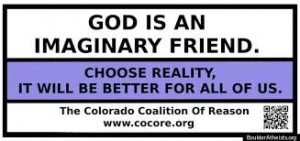“God is an imaginary friend for grownups.”
This seems to be one of the materialists’ favorites catch phrases these days. Last year one group even went so far as to put a version of the phrase on billboards here in Denver.
As near as I can tell from my research, the phrase originated in a 2004 Owen Wilson bomb called The Big Bounce. Wilson’s character Jack is talking to his friend Walter played by Morgan Freeman:
Walter: “Have a little faith.”
Jack: “Faith? You mean like faith in God?”
Walter: “No, God is an imaginary friend for grownups.”
As readers of my posts will know, finding irony is one of my favorite pastimes. Today we will explore the irony of the “dogmatic skeptic.”
I invite you to visit the website of the Colorado Coalition of Reason (“COCORE”), the group that put up the billboard in Denver. Look at the self-descriptions of the various groups that formed the coalition. Nearly every one contains the word “skeptic.” My dictionary defines “skeptic” as “a person who habitually doubts the authenticity of accepted beliefs.” My dictionary defines “dogmatist” as “a person who asserts his or her opinions in an unduly positive or arrogant manner; a dogmatic person.”
The billboard asserts as an undoubted fact that God does not exist in reality. That is what it means to describe him as “imaginary.” But has anyone ever disproved God’s existence? Of course not. Even Richard Dawkins, the most famous anti-theist in the world, admits that he cannot have apodictic certainty that God does not exist. In his famous 2012 dialogue with Rowan Williams ,Dawkins would go only so far as to say, “I think the probability of any supernatural creator existing is very, very low, which is why I say I’m a 6.9.”
The number “6.9” is an allusion to Dawkins’ own “scale of theist probability” from his book The God Delusion. The number “6” on the 7 point scale correlates with: “I don’t know for certain but I think God is very improbable, and I live my life on the assumption that he is not there.”
My point is not to show that God exists. My point is that all honest people will admit that his non-existence has not been proven as a certain fact. Even Richard Dawkins admits that he cannot be certain about God’s existence, and that there is at least some possibility that God does exist (though, in his opinion, the probability is very low).
Now consider the tone of the COCARE billboard. Is smug certainty such as that expressed in the catch phrase the sort of tone one would expect from a “skeptic”? After all, isn’t a disdain for haughty certitude the very essence of skepticism? The tone of the billboard is not the least bit skeptical. In fact, the billboard has a kind of dogmatism about it wouldn’t you say? So-called “skeptics” like those who put up this billboard like to make fun of “fundies.” But their billboard demonstrates an uncritical arrogant dogmatism that would make the most committed fundamentalist blush. And that, my friends, is the irony of the day.
